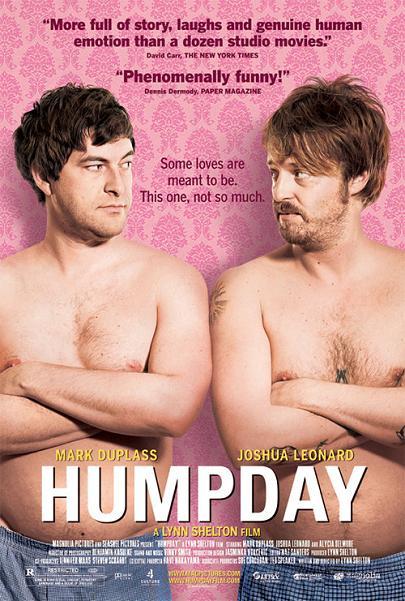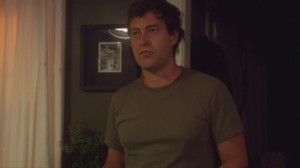An interview with Lynn Shelton, the director of Humpday
 Lynn Shelton, the director of Humpday (review and podcast here), was supporting her movie and I got a chance to pester her in person.
Lynn Shelton, the director of Humpday (review and podcast here), was supporting her movie and I got a chance to pester her in person.
Humpday is about two friends from college, now older. Ben (played by one of the credited pioneers of the Mumblecore movement, writer/director of The Puffy Chair and Baghead, Mark Duplass), is domesticated, and Andrew (played by The Blair Witch Project‘s Joshua Leonard) is bohemian (in his mind). Both, while drunk at a party, challenge each other to star in an “arty” gay porn together. Ben has to convince his sensible and smart wife Anna that he needs to go forward with the movie before they start a family, even though Ben doesn’t really believe that. He refuses to back out of the porn movie out of a sense of macho honor, while trying to goad Andrew (who had shown up unnanounced on Ben and Anna’s door just a few days before) into quitting instead. The review of the movie itself will be posted on July 31st, the local release date. As for the filmmaker herself, Shelton works out of Seattle and has had two features produced before Humpday — My Effortless Brilliance and We Go Way Back. They have struggled to find distribution. But starting August 13th, IFC will begin airing My Effortless Brilliance and Shelton has just bought back the rights to We Go Way Back and hopes to have it out soon.
 AL: Right after seeing Humpday, I noticed the poster in the lobby, and it could not have been more off-putting and misleading. It wasn’t because they were both bare-chested; it just suggests that it’s a movie about bears [the gay subculture of hairy, heavy men].
AL: Right after seeing Humpday, I noticed the poster in the lobby, and it could not have been more off-putting and misleading. It wasn’t because they were both bare-chested; it just suggests that it’s a movie about bears [the gay subculture of hairy, heavy men].
LS: The whole thing about the distributors and the whole experience of speaking to the distributors at Sundance [where the distributor, Magnolia, purchased Humpday], because, I was really happy that we went with Magnolia, because Magnolia had this vision that the film was a little film that — with the right marketing — could expand into cineplexes, and into the mall… If it was done right. The ironic thing is that the one line pitch of the movie is so Farrelly-brothers-raunchy sounding. And people who had to see the film came up to me and said “I never would have seen the film because the description was so off-putting and I loved it so much.” And my worry is, “How do we get those people to come?” And, I think, word-of-mouth and critical review will have a huge impact, and those people will find themselves there. Hopefully, their instinct — the way the poster is — will actually…. Because we have had a lot of positive feedback that people think [the poster is] funny and intriguing. But it’s always a guessing game. But it’s hard to figure out how to market it.
AL: But the poster is so misleading… But I don’t decide the marketing.
 LS: Well I didn’t either, quite frankly… I was never interested in making a broad farce, I was interested in taking this ridiculous premise and treat it in a believable way. So we all took the challenge of it; we were sort of on high alert for false notes, especially on set. We were constantly asking, “Do we buy this? Will people buy this?” Truthfully, the whole thing was scripted, not traditionally. But there was a very strict outline. But the words were all improvised. I told them what the emotional map of each scene has to be and we all were on the same page about that, because I wanted the naturalism of the improv. But the structure of a, kind of, classic movie-going experience, where you’re like “what’s gonna happen next” at the end of every scene… But when we got to that last scene, we’d shot the whole film in sequence. So everything had been shot, and I said, “you guys really know who Andrew and Ben are at this point, and I need for you to live this scene out as honestly as you can as these two guys.” When people say, “could it have ended a different way?” Well we were open to anything that was going to unfold. But that was what had to happen , because they were being true to the characters.
LS: Well I didn’t either, quite frankly… I was never interested in making a broad farce, I was interested in taking this ridiculous premise and treat it in a believable way. So we all took the challenge of it; we were sort of on high alert for false notes, especially on set. We were constantly asking, “Do we buy this? Will people buy this?” Truthfully, the whole thing was scripted, not traditionally. But there was a very strict outline. But the words were all improvised. I told them what the emotional map of each scene has to be and we all were on the same page about that, because I wanted the naturalism of the improv. But the structure of a, kind of, classic movie-going experience, where you’re like “what’s gonna happen next” at the end of every scene… But when we got to that last scene, we’d shot the whole film in sequence. So everything had been shot, and I said, “you guys really know who Andrew and Ben are at this point, and I need for you to live this scene out as honestly as you can as these two guys.” When people say, “could it have ended a different way?” Well we were open to anything that was going to unfold. But that was what had to happen , because they were being true to the characters.
 AL: Considering that Joshua Leonard looks like Owen Wilson, was there ever any impulse to call the movie You, Me, and Duplass ?
AL: Considering that Joshua Leonard looks like Owen Wilson, was there ever any impulse to call the movie You, Me, and Duplass ?
LS: [laughs] Ummm. No…[big laugh] We were a month away from shooting, and I found about [You, Me, and Dupree] and I had to make sure I wasn’t remaking this movie. And the very beginning, I was like, “Oh, shit.” And then very quickly, I was like, “No sweat.” It’s a very different movie. Luckily.
AL: You shot on video and without a script, did you ever have the instinct to get Lars Von Trier’s approval and shoot it Dogme 95?
LS: I love Dogme and I think it’s pretty cool, but I have no interest in making a strictly Dogme film. I’d rather steal elements that I like about Dogme. I think the whole scaled down idea really works, it really helps put people at ease and create the level of naturalism that I really love.
AL: Do you think that the fact that Hollywood is now shooting big budget movies like Public Enemies on intentionally lower grade video will help or hurt you? Like your movies won’t seem so unique?
 LS: For me, I’m a big proponent of the marriage of form and function. If you look at a film like 28 Days Later, that the fact that was shot on video didn’t have anything to do with budget. Just like with Public Enemies — clearly there was an aesthetic choice. And when you shoot on video, you’re trying to inform the dramatic action by choosing that medium. I think it’s really a case-by-case basis. Video was right for [Humpday] but it was also practical, because I wanted to be able to keep the camera on for 20 or 30 minutes at a time… I love film. I hope be able to shoot with film. But at some point, not far from now, no one is going to be shooting on film. It’s going to be a difference between, “Are you shooting on the Red or some high end digital camera that looks like film, or are you shooting on some lower resolution version?”
LS: For me, I’m a big proponent of the marriage of form and function. If you look at a film like 28 Days Later, that the fact that was shot on video didn’t have anything to do with budget. Just like with Public Enemies — clearly there was an aesthetic choice. And when you shoot on video, you’re trying to inform the dramatic action by choosing that medium. I think it’s really a case-by-case basis. Video was right for [Humpday] but it was also practical, because I wanted to be able to keep the camera on for 20 or 30 minutes at a time… I love film. I hope be able to shoot with film. But at some point, not far from now, no one is going to be shooting on film. It’s going to be a difference between, “Are you shooting on the Red or some high end digital camera that looks like film, or are you shooting on some lower resolution version?”
AL: You’ve said in the past that you don’t like the term Mumblecore, and DIY is not necessarily flattering either.
LS: It bothers me less though. There’s something inherent about Mumblecore that’s just reductive… What would I call it instead?
AL: Like mid-20’s white guys suffering from post-collegiate ennui who, even though they don’t surf, all call each other dude — and aren’t Noah Baumbach?
 LS: Except I can’t be grouped in that anymore, if you call it that. That’s the thing, if you look at the original articles about Mumblecore, I don’t match any of those items. If you define the movement by people putting their own films together, using improvisation in some form or another and a lot of hand-held cameras or cinema-verite style, then I would fit. But I certainly don’t fit the standard definition.
LS: Except I can’t be grouped in that anymore, if you call it that. That’s the thing, if you look at the original articles about Mumblecore, I don’t match any of those items. If you define the movement by people putting their own films together, using improvisation in some form or another and a lot of hand-held cameras or cinema-verite style, then I would fit. But I certainly don’t fit the standard definition.



